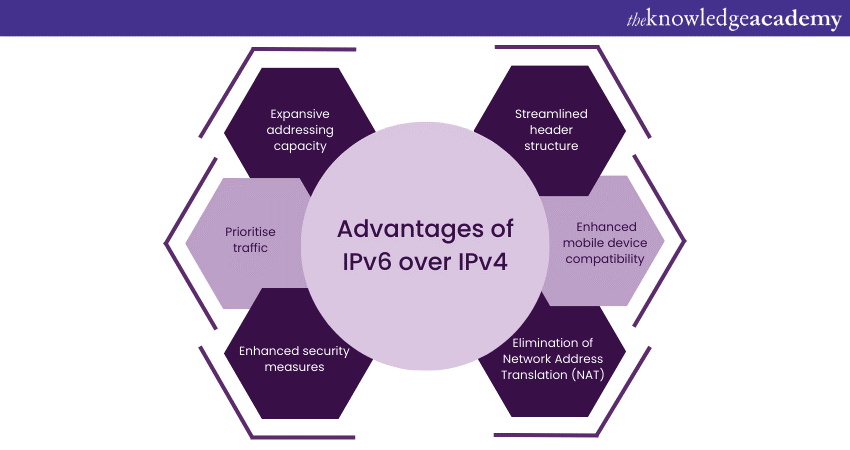We may not have the course you’re looking for. If you enquire or give us a call on +32 35001305 and speak to our training experts, we may still be able to help with your training requirements.
We ensure quality, budget-alignment, and timely delivery by our expert instructors.

The demand for a sophisticated and scalable internet protocol becomes more apparent with the ongoing evolution of the digital landscape. In this scenario, IPv6 stands out as a revolutionary resolution, paving the way for a fresh era of connectivity. This blog delves into the Advantages of IPV6 over IPv4, shedding light on its larger address space, heightened security provisions, and seamless adaptability.
Explore with us as we describe the Advantages of Ipv6 and why it is a future-ready choice for the interconnected world. Read more for a better understanding.
Table of Contents
1) What is an IP Address?
2) What is IPV4?
3) What is IPv6?
4) Advantages of IPv6 over IPv4
5) Conclusion
What is an IP Address?
An Internet Protocol (IP) address serves as an exclusive numerical identifier allocated to every device linked to a computer network utilising the Internet Protocol for communication purposes. In simpler terms, it is like a digital identifier for a device on a network, allowing it to be located and communicate with other devices over the Internet.
IP addresses play an imoportant role in the functioning of the internet by facilitating the identification and routing of data packets between devices. IPv6 Interview Questions often highlight that IP addresses are composed of a series of numbers separated by periods, available in two versions: IPv4 (Internet Protocol version 4) and IPv6 (Internet Protocol version 6).
What is IPV4?
IPv4 is a previous version of the Internet Protocol that serves as the foundation for how data is transmitted over networks, including the internet. In simple terms, IPv4 is a set of rules that enables communication between devices by assigning unique numerical labels, known as IP addresses, to each device connected to a network.
While IPv4 has been a cornerstone of internet communication, its limitation in available unique addresses has become apparent due to the ever-growing number of internet-connected devices. As a result, the technology industry is gradually transitioning to IPv6 (Internet Protocol version 6), which uses a 128-bit addressing format to accommodate a significantly larger pool of unique addresses.
Ace Your Network Security Interview! Explore Top Network Security Interview Questions and Answers to Boost Your Confidence and Secure the Job!
What is IPv6?
IPv6 represents the latest version of the Internet Protocol, the framework dictating the rules for transmitting and receiving data online. Designed as an upgrade to IPv4 (Internet Protocol version 4), IPv6 aims to overcome the constraints associated with the finite address capacity of its predecessor.
What sets IPv6 apart from its predecessor, IPv4, is its utilisation of a 128-bit address format. It provides a significantly larger pool of unique addresses to accommodate the ever-growing number of connected devices worldwide.
Master IPv6 Protocols with These Essential Interview Questions! Prepare for Your Next IT Interview with Our Expert-Compiled IPv6 Questions and Answers!
Advantages of IPv6 over IPv4
The most recent iteration of the Internet Protocol, IPv6, brings forth several advantages over its predecessor, IPv4. These advantages include:

1) Expansive addressing capacity
IPv6 offers a substantially expanded address space in contrast to IPv4, meeting the growing need for internet-connected devices and users. With its utilization of 128-bit addresses, as opposed to IPv4's 32-bit addresses, IPv6 provides an enormous pool of approximately 3.41038 unique addresses. This marks a considerable enhancement over IPv4's capacity, which is limited to 4.3 billion unique addresses.
Improve your networking skills with our Troubleshooting and Maintaining Cisco IP Networks Course - visit the link to join!
2) Prioritise traffic
IPv6 offers improved support for Quality of Service (QoS) functionalities, empowering internet service providers to prioritise traffic. This guarantees that essential applications such as voice and video, receive the required bandwidth and encounter minimal latency.
3) Enhanced security measures
IPv6 is equipped with built-in security features, including IPsec, which ensures data integrity, authentication, and encryption for internet traffic. This inherent security mechanism fortifies internet communication, safeguarding against malicious attacks such as eavesdropping, manipulation, and impersonation.
4) Streamlined header structure
In contrast to IPv4, IPv6 boasts a simpler and more efficient header structure. This not only reduces processing costs but also enhances internet connection speed. Additionally, the allocation and management of addresses become more straightforward for internet service providers.
5) Enhanced mobile device compatibility
Today, as smartphones and tablets become increasingly ubiquitous, IPv6 provides enhanced assistance for mobile devices. This progress enables faster and more secure internet connectivity and communication among these devices, perfectly catering to the requirements of today's mobile-oriented society.
Explore the fundamentals of IPv6 with IPv6 Basics Course. Join today!
6) Elimination of Network Address Translation (NAT)
Although NAT has been effective in prolonging the viability of IPv4, it entails scrutinising and modifying every packet entering or leaving a network. This poses challenges, especially for services using multiple ports, as they must undergo intricate adjustments to function properly. IPv6, on the other hand, provides a solution by giving a unique IP address to each device, eliminating the necessity for NAT.
Conclusion
IPv6's advantages over IPv4 signify a fundamental evolution in internet architecture, with expanded address space, efficient routing, enhanced security, and IoT compatibility. Its support for auto-configuration, multicast, anycast, and future-proofing make it the logical choice for internet growth. As organisations adopt IPv6, the internet ecosystem becomes more resilient and adaptable, marking a strategic investment in future connectivity.
Explore our expert-led Cisco Training for advanced networking skills. Sign up now!
Frequently Asked Questions
What are the Other Resources and Offers Provided by The Knowledge Academy?

The Knowledge Academy takes global learning to new heights, offering over 3,000 online courses across 490+ locations in 190+ countries. This expansive reach ensures accessibility and convenience for learners worldwide.
Alongside our diverse Online Course Catalogue, encompassing 19 major categories, we go the extra mile by providing a plethora of free educational Online Resources like News updates, Blogs, videos, webinars, and interview questions. Tailoring learning experiences further, professionals can maximise value with customisable Course Bundles of TKA.
Upcoming IT Infrastructure & Networking Resources Batches & Dates
Date
 IPv6 Basics
IPv6 Basics
Thu 8th May 2025
Thu 3rd Jul 2025
Thu 4th Sep 2025
Thu 6th Nov 2025






 Top Rated Course
Top Rated Course



 If you wish to make any changes to your course, please
If you wish to make any changes to your course, please


